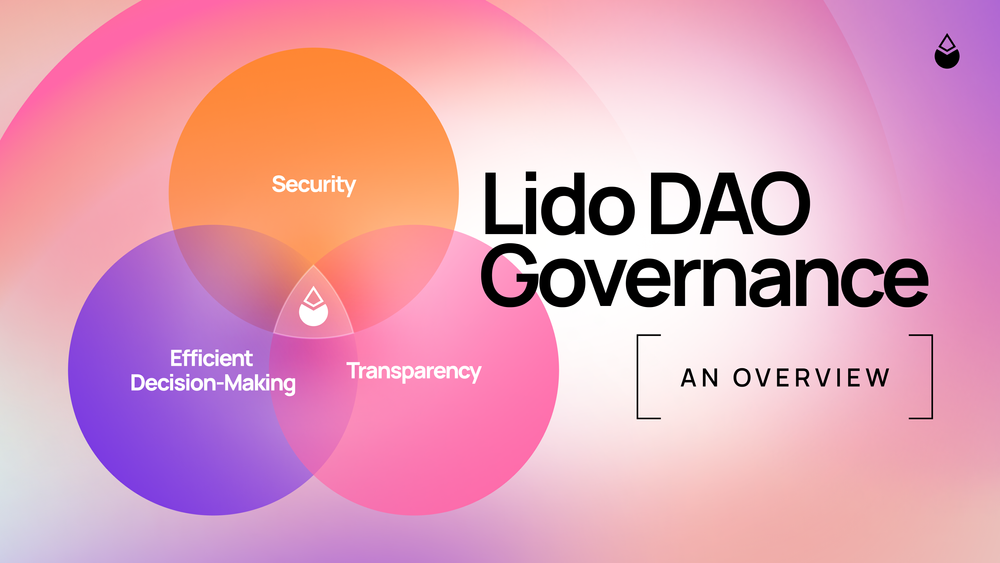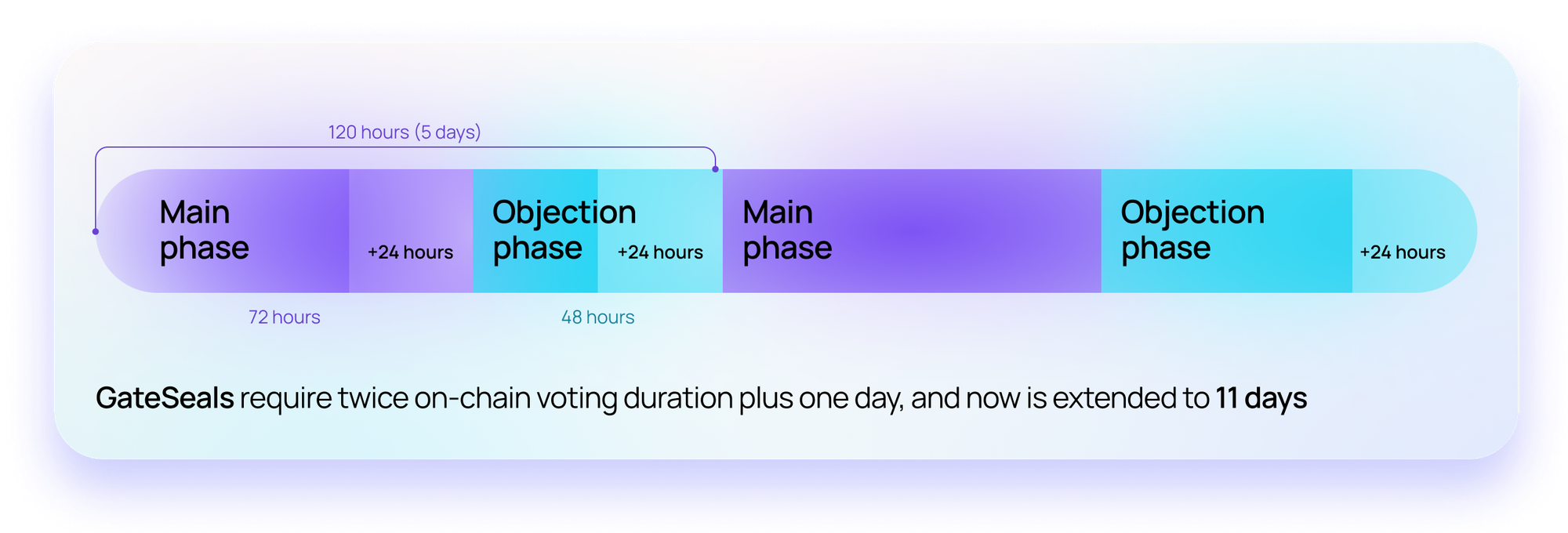Lido DAO Governance: Security Measures & Oversight

Introduction
As DAOs scale, so do the risks and challenges of governance. The larger the protocol, the greater the responsibility to ensure secure, decentralized, resilient, and trackable decision-making.
Lido DAO is committed to navigating these complexities—continuously working toward trustless, governance-minimized, and ethos-aligned decision-making. While progress has been made (as you can follow on the Lido Scorecard), governance must adapt to an evolving ecosystem.
This article outlines recent governance updates and ongoing efforts to boost security, foster participation, and maintain transparency — as Lido grows, so does the work to strengthen the DAO.
Three-Step Governance Process
The Lido governance process includes 3 steps: discussion, off-chain vote, and on-chain vote. It provides transparency and constitutes a deliberate decision-making process that works toward the DAO's goals of decentralization and ethos-aligned governance in several ways:
- Balanced participation: The combination of forum discussions (accessible to all), off-chain voting (gas-free), and on-chain execution creates multiple entry points for participation. By socializing all changes publicly before implementation, potential issues can be identified and addressed by the broader community.
- Transparency and public record: Every step of the process is documented publicly—from initial proposals and their refinements to middle checks, audits, votes, and final implementations. The Research forum ensures community visibility and early feedback.
- Gradual decision-making: The multi-step process prevents hasty decisions and swift voting proposals. The process is set, and each stage has a specific duration, making it obvious if malicious actors try to quickly push through harmful proposals.
Two-Phased On-Chain Voting
The on-chain voting consists of two phases: the main phase and the objection phase. In March 2025, their duration was extended:
- From 48 hours to 72 hours for the main phase,
- From 24 hours to 48 hours for the objection phase.
These changes were made to enhance voter participation and address key governance challenges:
- Narrow voting window: Delegates requested extended voting timeframes to allow enough time for proper review of proposals.
- Voting apathy: The initial voting duration at Lido's launch in December 2020 was 24 hours. This was later extended to 72 hours before evolving into the two-phase system (previously: 48-hour main phase, 24-hour objection phase). Since then, LDO has become more widely distributed, yet active voting power has declined from 88,364,207 LDO in Q4 2023 to 63,520,217 LDO in Q4 2024. These numbers demonstrate reduced voter participation, as decision-making now involves more people, yet fewer of them are actively participating in votes. Extending the voting timeframe gives tokenholders more time to assess and participate in governance decisions.
- Tokenholder oversight of delegates: With on-chain delegation, it may require more time for voters to ensure their delegates made the right choice and possibly override a delegate's vote. Longer durations of each phase give more room for these decisions to be considered.
- Risk-optimized equilibrium: The current process balances swift emergency responses with sufficient time for voter participation. While some DAOs opt for much longer voting periods, Lido DAO has chosen a practical middle ground—long enough for thorough governance decisions but short enough to react efficiently when needed.
The updated schedule is as follows:
- Main Phase: Wednesday 14:00 UTC → Saturday 14:00 UTC
- Objection Phase: Saturday 14:00 UTC → Monday 14:00 UTC
GateSeal: An Emergency Response Mechanism
GateSeal acts as an emergency brake on specific smart contracts, allowing for rapid action in response to critical vulnerabilities without waiting for the standard on-chain voting procedure to complete. This measure helps mitigate risks in the following ways:
- Targeted protection for fund movements: GateSeals can instantly pause specific contracts: Main GateSeal halts WithdrawalQueue (user withdrawals) and ValidatorExitBus (node operator exits)—to prevent unauthorized fund extraction during security incidents such as exploits, governance attacks, or network manipulation. CSM GateSeal provides extra protection for Core CSModule, CSAccounting, and CSFeeOracle smart contracts. Other protocol components remain unaffected to minimize disruptions.
- Time buffer for governance: GateSeal provides a crucial time buffer for the community to assess issues, propose solutions, and conduct votes before contracts automatically resume. If the issue cannot be resolved in time, LDO tokenholders can vote to extend the pause. If no action is taken, the contracts unpause automatically.
- Managed by a committee: However rapid the decision to trigger GateSeals could be, it still requires committee approval, with a 3/6 quorum, preventing unilateral single-party control over the tool.

To maintain the security and efficiency of the GateSeal mechanics, the seal duration was proposed to be twice the governance reaction time plus one day—providing buffer time for preparing proposals and communications, conducting the vote itself, and allowing additional time if a re-vote is necessary in case the first vote fails to meet quorum. As a result, the updated GateSeal duration after the on-chain vote extension is 11 days.
DAO Committees
Committees oversee specific areas such as node operations, rewards distribution, and treasury management, ensuring expert oversight while balancing governance efficiency and decentralization. This structure provides several advantages:
- Expert-driven decisions: Committees consist of contributors with specialized knowledge, ensuring informed governance.
- Secure and transparent operations: Each committee decision requires a predefined quorum through multisig policy, and all actions are recorded on-chain for full transparency and public accountability.
- Treasury management and responsibilities: Multisigs with a balance over $50K must have an unlimited allowance set to the Lido Aragon Agent. This mechanism ensures that funds remain retrievable if governance decides to recover them when needed.
- Accountability for routine operations: Routine decision-making is streamlined through Easy Track, reducing operational burdens while maintaining accountability for the DAO.
What's Next
These are the steps Lido DAO has taken toward strengthening governance security, improving voter participation, and refining decision-making.
You can participate by following the new proposals on the Research Forum, Snapshot, and on-chain. Track progress on the Lido Scorecard to see how these updates are making a difference. Up next, Dual Governance will bring additional decentralization and security improvements.